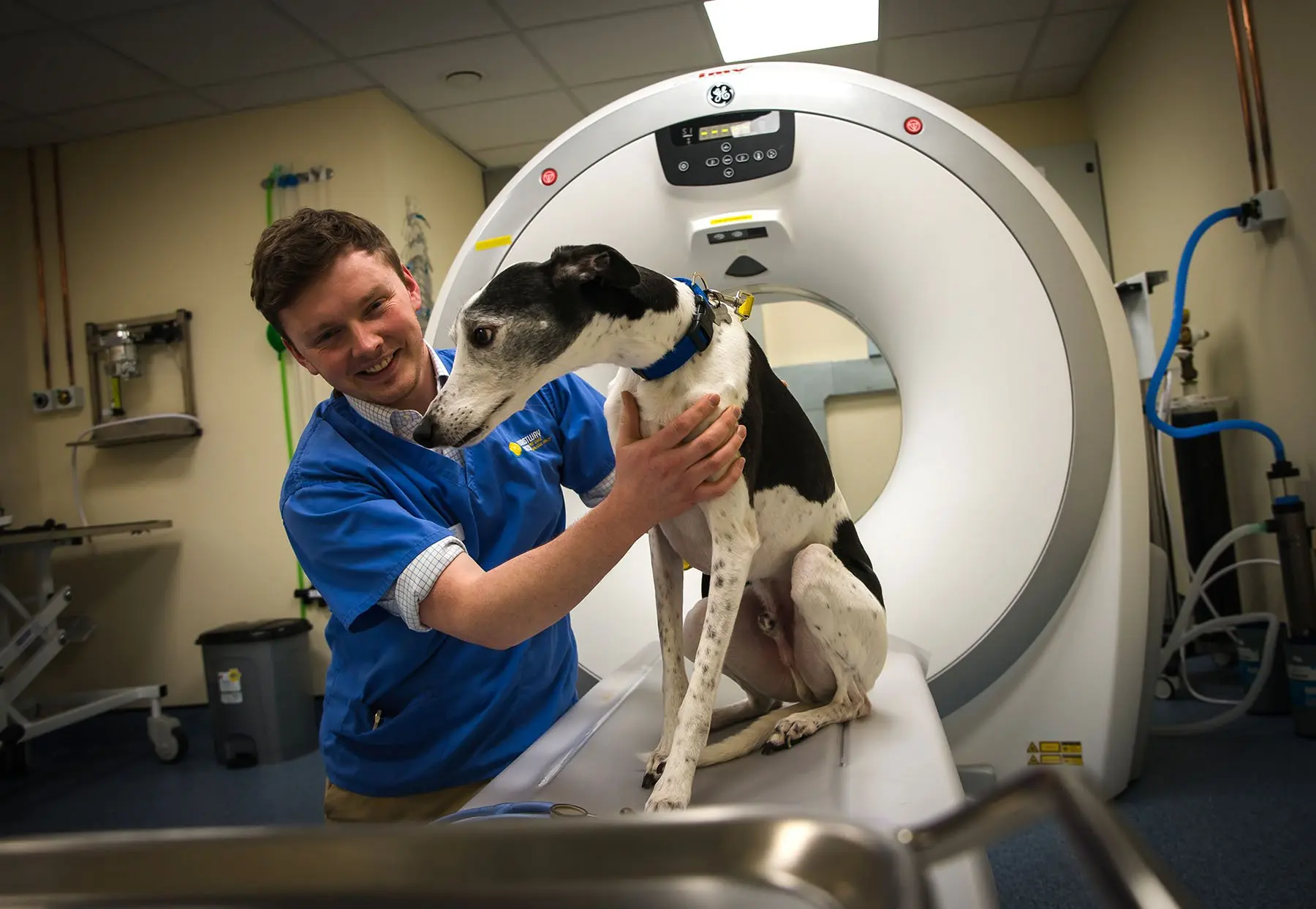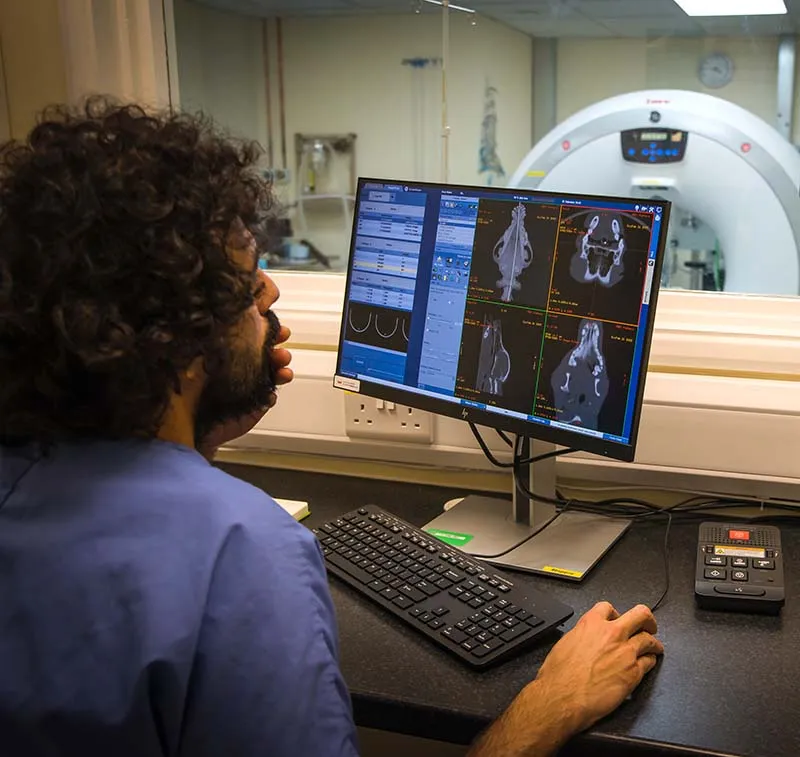Advanced diagnostics for your pet
At our Brighton veterinary hospital, we are proud to offer advanced diagnostic and treatment options to ensure that your beloved furry companion receives the best possible care. One of the technologies that we utilise is a CT scanner, which provides valuable insights into the health of your pet and can help us identify and treat underlying medical conditions.
At our Brighton veterinary hospital, we are proud to offer advanced diagnostic and treatment options to ensure that your beloved furry companion receives the best possible care. One of the technologies that we utilise is a CT scanner, which provides valuable insights into the health of your pet and can help us identify and treat underlying medical conditions.
What is a CT scanner?
CT (Computed Tomography) is an advanced imaging technique that utilises multiple X-ray images to create detailed cross-sectional images of the body. The machine rotates around the patient, taking images from different angles, and then combines all of the data to create a detailed 3D image of the area being scanned.
CT (Computed Tomography) is an advanced imaging technique that utilises multiple X-ray images to create detailed cross-sectional images of the body. The machine rotates around the patient, taking images from different angles, and then combines all of the data to create a detailed 3D image of the area being scanned.
How does CT help in veterinary practice?
CT scanners provide many advantages over traditional X-rays by providing much more detailed images of the internal structure of the body. It allows us to diagnose and treat various conditions with greater precision and efficiency. There are numerous benefits of using CT in veterinary practice:
Improved Accuracy
Since CT scans provide more detailed images than traditional X-rays, it helps in identifying underlying issues such as internal bleeding, masses, tumours, or blockages more accurately. This means that diagnoses can be made earlier, increasing the chance for successful treatment outcomes.
Less invasive
In some cases, CT scanning eliminates the need for exploratory surgery, reducing the risk of complications associated with surgical procedures. This is especially beneficial for older animals or those with underlying health issues who may not be able to tolerate invasive procedures.
Faster diagnosis
With quick results obtained from a CT scan, the diagnosis and subsequent treatment can begin promptly, leading to better outcomes and faster recovery times for your pet.
Improved Treatment Planning
Based on the information obtained from the CT scans, we tailor treatment plans suited to individual animals’ specific needs and medical conditions with high accuracy.
Supports veterinarians in making effective decisions
Our team uses CT to visualise and assess internal organs including the heart, lungs, liver, spleen, kidneys, and intestines. The detailed images provided by CT support our veterinary surgeons in making informed decisions about the best treatment methods for your pet’s medical issues.
CT scanners provide many advantages over traditional X-rays by providing much more detailed images of the internal structure of the body. It allows us to diagnose and treat various conditions with greater precision and efficiency. There are numerous benefits of using CT in veterinary practice:
Improved Accuracy
Since CT scans provide more detailed images than traditional X-rays, it helps in identifying underlying issues such as internal bleeding, masses, tumours, or blockages more accurately. This means that diagnoses can be made earlier, increasing the chance for successful treatment outcomes.
Less invasive
In some cases, CT scanning eliminates the need for exploratory surgery, reducing the risk of complications associated with surgical procedures. This is especially beneficial for older animals or those with underlying health issues who may not be able to tolerate invasive procedures.
Faster diagnosis
With quick results obtained from a CT scan, the diagnosis and subsequent treatment can begin promptly, leading to better outcomes and faster recovery times for your pet.
Improved Treatment Planning
Based on the information obtained from the CT scans, we tailor treatment plans suited to individual animals’ specific needs and medical conditions with high accuracy.
Supports veterinarians in making effective decisions
Our team uses CT to visualise and assess internal organs including the heart, lungs, liver, spleen, kidneys, and intestines. The detailed images provided by CT support our veterinary surgeons in making informed decisions about the best treatment methods for your pet’s medical issues.
In what cases CT scans may be necessary?
CT scans may be necessary for several reasons such as:
Orthopaedic Injuries
CT scans can identify orthopaedic injuries such as fractures and joint abnormalities with greater accuracy compared to traditional radiographs.
Cancer Diagnosis
CT scanning is highly valuable in diagnosing cancers in pets and helps in determining the location, extent, and size of masses.
Traumatic Injuries
CT scanning is used to identify internal bleeding in pets who have experienced blunt force trauma from a car accident or a fall.
Dental disease
CT scanning provides high detailed images of the skull and is particularly useful for evaluating dental and maxillofacial structures, including for small mammals such as rabbits and guinea pigs. It allows for accurate evaluation of complex dental pathology and disease, including tooth-root fractures, periodontitis, abscesses, cysts, and tumours.
If your pet’s veterinary care requires access to our CT scanner, we ensure that we fully explain the procedure of having a pet scanned and answer any questions you may have. Our veterinary nurses along with our experienced veterinary surgeons will carry out the scan and ensure that your pet remains safe and calm during the entire process.
CT scans may be necessary for several reasons such as:
Orthopaedic Injuries
CT scans can identify orthopaedic injuries such as fractures and joint abnormalities with greater accuracy compared to traditional radiographs.
Cancer Diagnosis
CT scanning is highly valuable in diagnosing cancers in pets and helps in determining the location, extent, and size of masses.
Traumatic Injuries
CT scanning is used to identify internal bleeding in pets who have experienced blunt force trauma from a car accident or a fall.
Dental disease
CT scanning provides high detailed images of the skull and is particularly useful for evaluating dental and maxillofacial structures, including for small mammals such as rabbits and guinea pigs. It allows for accurate evaluation of complex dental pathology and disease, including tooth-root fractures, periodontitis, abscesses, cysts, and tumours.
If your pet’s veterinary care requires access to our CT scanner, we ensure that we fully explain the procedure of having a pet scanned and answer any questions you may have. Our veterinary nurses along with our experienced veterinary surgeons will carry out the scan and ensure that your pet remains safe and calm during the entire process.





